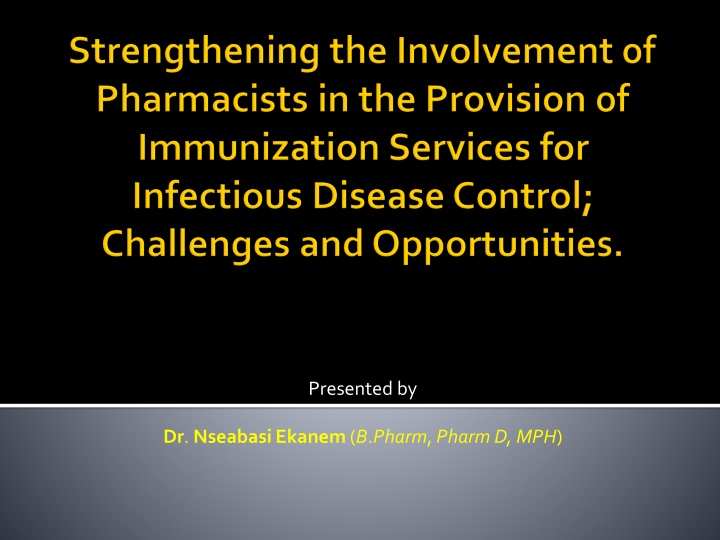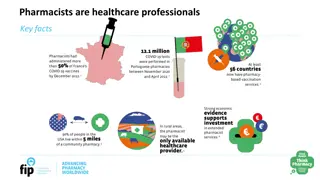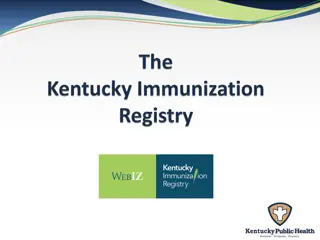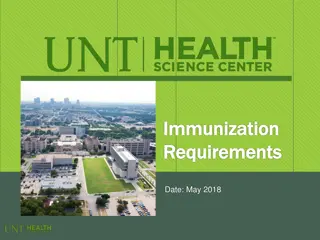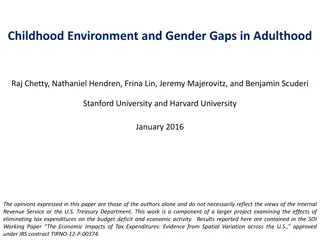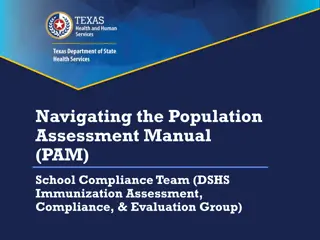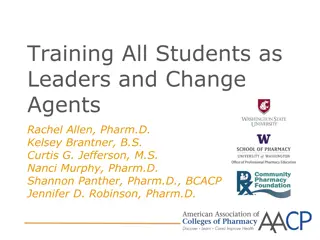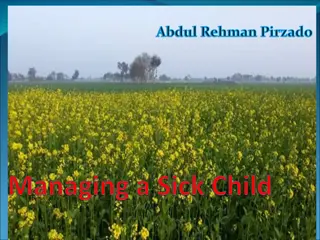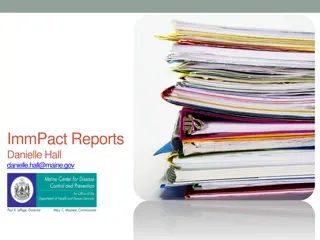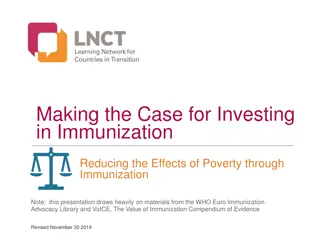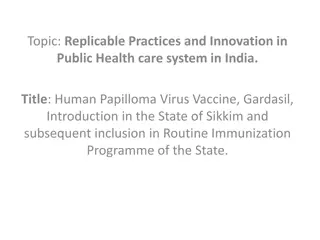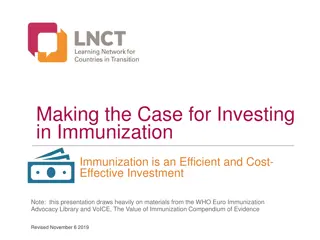Pharmacists' Role in Immunization: Gaps, Opportunities, and Challenges
Nigeria and other LMICs face challenges in routine immunization coverage. The Covid-19 pandemic exacerbated the situation, highlighting the critical role of pharmacists in primary care. This presentation discusses why pharmacists must be involved, the limitations they face, opportunities for engagement, and the need for policy advocacy to address immunization gaps. The accessibility and extended hours of pharmacies make them vital in reaching populations, such as working nursing mothers, who may find it difficult to access traditional healthcare facilities for immunization services.
Download Presentation

Please find below an Image/Link to download the presentation.
The content on the website is provided AS IS for your information and personal use only. It may not be sold, licensed, or shared on other websites without obtaining consent from the author.If you encounter any issues during the download, it is possible that the publisher has removed the file from their server.
You are allowed to download the files provided on this website for personal or commercial use, subject to the condition that they are used lawfully. All files are the property of their respective owners.
The content on the website is provided AS IS for your information and personal use only. It may not be sold, licensed, or shared on other websites without obtaining consent from the author.
E N D
Presentation Transcript
Presented by Dr. NseabasiEkanem(B.Pharm, PharmD, MPH)
Introduction Pharmacists and Immunization Gaps and opportunities for involvement of Pharmacists Reasons why Pharmacists must be involved Challenges/Limitations Opportunities and Policy advocacy Conclusion
Nigeria as well as other LMICs are far behind in routine immunization coverage. The Covid-19 pandemic has drawn us further down (UNICEF, 2021) Up to 35.1% of infants born in Sub-Saharan Africa have not completed their vaccination. (Andrew Hayen et al 2022). Consequently, Africa has the highest burden of childhood vaccine- preventable diseases (WHO s GBD 2020). Poor access to health facilities, low manpower, inequality and poor maternal health seeking behavior are contributing factors. (Andrew Hayen et al 2022).
The roles of Pharmacists in providing primary healthcare has been limited over many decades. The Covid-19 pandemic brought to bare the critical roles of Pharmacists in providing primary care. In USA, over 40% of Americans got their Covid-19 shots at community pharmacies. In Nigeria, community pharmacies have now been enlisted as Covid-19 vaccination centers by NPHCDA. Unfortunately, most of the interventions made during the pandemic were not documented. CPs must help generate data to support advocacy efforts.
Birth rate is increasing without comenserateincrease in immunization service delivery facilities and personnel. There is an increase emigration of health workers from Africa to North America and UK. The few healthcare workers available are overwhelmed in managing outbreaks like Covid-19, Lassa, Cholera and Yellow fever. Covid-19 pandemic has increased the apathy for clinic visits. People feel pharmacies are safer. Busy nursing mothers experience difficulty visiting immunization clinics during regular working hours.
Achieving optimum coverage of Universal Birth-dose Vaccines requires an multidisciplinary approach. Community Pharmacists are the most accessible healthcare workers. Pharmacies are highly ubiquitous. Available almost everywhere. Pharmacies operate for extended hours which makes them accessible to working class nursing mothers. Pharmacy Based Immunization does not necessarily require appointments and beaurocracies. Walk-in clients can be served in minutes.
Overcrowded Immunization Clinic Total Pharmacy Dallas, Texas
Community Pharmacists are the first point of contact for members of the community seeking health services. Most public immunization clinics are overcrowded and thus can support the transmission of infectious respiratory diseases, hence the need to decentralized services. Most community pharmacies have pre-existing cold- chain storage systems in their premises. There is access to anti-allergic therapy should there be a mild to moderate vaccine adverse reactions during immunization.
Unfavorable policy and practice environment. Lack of cooperation among healthcare workers. Lack of interest in CPD programs among Pharmacists. Poor documentation of primary care interventions by Community Pharmacists. Low public awareness of the PHC roles played by Pharmacists in the community. Intra-professional strive.
Dr. Nseabasi Ekanem and Pharm (Mrs.) Lawal providing training to community pharmacists on vaccine administration and delivery.
Engagement of policymakers on Task shifting Task sharing strategies on immunization. Adoption of a Multidisciplinary and Multisectoral approach to primary health service delivery. Strengthening of Pharmacists' capacity in delivering immunization services through CPD programs and inter-agency knowledge sharing. Improvement in documentation and research among community pharmacists so as to generate evidences to support ongoing advocacy efforts. Strengthening public and professional awareness of Pharmacists' PHC roles in the community.
Dr. Nseabasi Ekanem speaking on Pharmacy Based Immunization at Channels TV Nigeria.
Pharmacists are very critical in achieving Universal Birth-dose Immunization coverage in Africa and beyond. Pharmacists particularly those working in the community must be fully recognized as primary healthcare service providers and allowed to provide such services. All policy and regulatory barriers to Pharmacists' involvement in immunization must be adequately addressed. Involvement of Pharmacists in delivering routine immunization services in Africa will remarkably improve service efficiency and access. Thus, putting us on track towards Universal Immunization Coverage by the year 2030.
Thank you for your time
